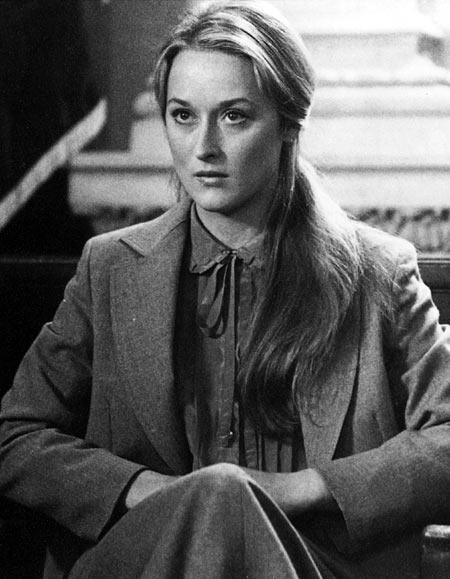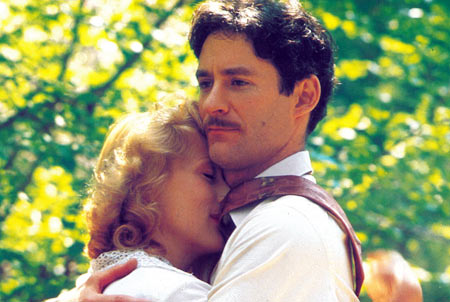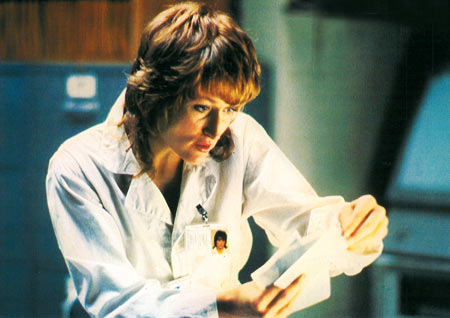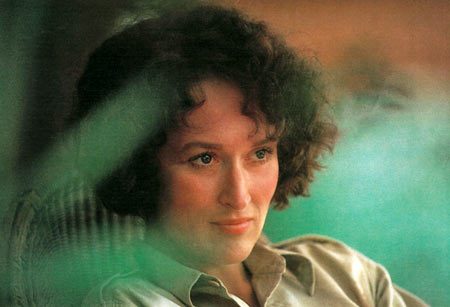Aseem Chhabra in New York
Aseem Chhabra revisits his favourite Meryl Streep films that were showcased at the recent Berlin International Film Festival.
There is a beautiful scene towards the end of Mike Nichols' 1983 film Silkwood. Meryl Streep's Karen Silkwood stands facing the camera (actually looking at her beau Drew Stephens, played by Kurt Russell).
She is glowing, laughing and the camera captures her in slow-motion, as she flirtatiously lifts the left side of her black leather jacket to reveal her t-shirt, but the focus seems to be on the shape of her breast. At the same moment, we hear Streep sing Amazing Grace -- it's just her haunting melodious voice, no music.
In that last shot of Silkwood, Streep looks playful, vivacious and tremendously sexy. In the 1980s, my 20-something self was madly in love with Streep.
I believed in every character she played, laughed, felt their pain and cried with them -- especially cried. Meryl Streep taught me that crying while watching films could be one of life's most emotionally satisfying experiences. I remember crying watching her as the tortured Sophie in Alan J Pakula's Sophie's Choice and as the tremendously lonely Karen Bixen in Out of Africa.
I also remember shedding a few tears for Streep's Joanna Kramer in Robert Benton's Kramer vs Kramer -- an unhappy woman, who first abandons her child, but then comes back to seek his custody. The sadder her roles were, the more I felt drawn to her, as an actress, as a person.
'I felt the need to rekindle my romance'
Image: Meryl Streep and Kevin Kline in Sophie's ChoiceLast week, I revisited my love affair with Meryl Streep at the Berlin International Film Festival.
The festival's programmers honoured Streep for her lifetime contribution to the world of cinema. There was the German premiere of her latest film The Iron Lady, and in recognition of the fact that this year's Oscar ceremony marks her 17th nomination, the festival also organised a mini retrospective of her films.
I was in Berlin to see new films. But then I had two separate conversations with a Pakistani journalist and another with two young Indian women and learned that they had not heard of Streep's 1982 film Sophie's Choice -- one of the most important films in my life in America.
I then realised this was a rare opportunity to see Streep's best works again on big screen. I still regard her as the greatest actress of our times, but I felt the need to rekindle the romance I had with her, and her personas on the screen.
It was indeed a special treat to watch four films in sold out screenings, packed with young Germans who were perhaps discovering Streep's early works for the first time and more seasoned filmgoers who, like me, were looking to reconnect with the films that defined their youth.
'I remember being blown away by her complex character in Kramer v/s Kramer'
Image: Meryl Streep in SilkwoodIn Silkwood, the true story of a working class woman who became a symbol of resistance against the ugly side of the nuclear industry, Streep is full of energy and life.
With her shaggy hair-cut, jeans, Streep's Silkwood is a no-nonsense woman living with her boyfriend and her lesbian friend (a surprising Cher).
Life is mostly fine -- although Silkwood has lost the custody of her three children to their father, until she starts to learn about the affects of nuclear contamination. And she wages a war against her employers -- a nuclear fuel processing facility, that will lead to disastrous results.
Silkwood was Streep's first collaboration with Nichols (they would work together again in Heartburn, Postcards From the Edge and the HBO version of Tony Kushner's Angels in America). The film works like a thriller. It is very entertaining, but there is a lot of purpose in Silkwood's story.
The next day at Berlin I saw Kramer vs Kramer, where Streep plays a supporting role to Dustin Hoffman. She won her first Oscar for the performance in the 1979 film.
But more important that was the first time I saw Streep on screen at the Archana theatre in New Delhi.
I remember being blown away by her complex character as a woman who seeks a second chance in life by her asking for her child. She seems icy, but she is also very fragile. Thirty three years later, the film -- the breakup in a marriage and the child left hanging in between, is still relevant and effective.
'I learned some valuable life lessons watching my favourite actress on the big screen'
Image: Meryl Streep in Out Of AfricaMade in 1982, Sophie's Choice is as joyful as it is deeply tragic. Sophie, a delicate beauty with a dark secret and horrifying experiences in Auschwitz, is given a new life by the charismatic Nathan Landau (a magnetic Kevin Klein).
There is so much spirit in Sophie's and Nathan's relationship and their friendship with their neighbour in Brooklyn -- a shy Southern writer named Stingo (Peter MacNicol). And that is why the lows in the film -- mostly caused by Nathan's schizophrenic behavior, are troubling.
The film is 30 years old, but it is impossible not to love Streep as Sophie, with her terrific Polish accent, her vulnerability, and her desire to live past her memories. And yes, watching Sophie's Choice in a dark theatre in Berlin, I cried again.
Many more tears were shed, watching Sidney Pollack's 1985 film Out of Africa. This time Streep does a perfect Dutch accent as her Karen Bixen creates a life in the middle of Africa. Men come and then abandon her, which add layers of sadness to her life. But Karen holds on to whatever love she can get.
Out of Africa boasts of some very romantic scenes -- when Karen's last love Denys Finch Hatton (a charismatic Robert Redford) washes her hair; or when he wipes blood from the edge of her lower lip that she bit, focusing her gun on a lion charging towards her. Coming out of the theatre I could hear Streep's Karen speaking to me: "If I know a song of Africa, does Africa know a song of me?"
Over the last three decades Streep has given us so much joy in a wide range of films. We now expect her to continues giving us excellent performances, even if the film -- such as The Iron Lady, is flat and uninspired. But I am purist and I truly believe that Streep's best works were in the 1980s -- a time when I learned some valuable life lessons watching my favourite actress on the big screen.





Comment
article